

Language school. A language school is a school where one studies a foreign language.
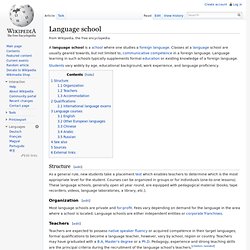
Classes at a language school are usually geared towards, but not limited to, communicative competence in a foreign language. Language learning in such schools typically supplements formal education or existing knowledge of a foreign language. Students vary widely by age, educational background, work experience, and language proficiency. Structure[edit] Organization[edit] Most language schools are private and for-profit. Teachers[edit] Teachers are expected to possess native speaker fluency or acquired competence in their target languages; formal qualifications to become a language teacher, however, vary by school, region or country. Accommodation[edit] Many language schools offer various kinds of accommodation to their students: host family (homestays), campus residences, shared housing, or even hotels. Host families may live close to the selected school and students can go there walking or by public transport.
Online Japanese Language Lessons - San Diego, Los Angeles, California. Elluminate Live. Elluminate Live!
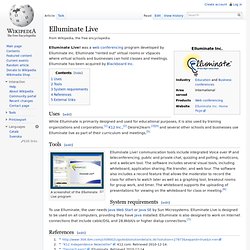
Was a web conferencing program developed by Elluminate Inc. Elluminate "rented out" virtual rooms or vSpaces where virtual schools and businesses can hold classes and meetings. Elluminate has been acquired by Blackboard Inc. Uses[edit] While Elluminate is primarily designed and used for educational purposes, it is also used by training organizations and corporations.[1] K12 Inc.,[2] Desire2learn [3][4] and several other schools and businesses use Elluminate live as part of their curriculum and meetings.[5] Tools[edit] A screenshot of the Elluminate Live program Elluminate Live!
System requirements[edit] To use Elluminate, the user needs Java Web Start or Java SE by Sun Microsystems. References[edit] External links[edit] Elluminate. Online Collaboration Software for Engaging, Collaborative Learning. Center for Applied Linguistics. The Center for Applied Linguistics (CAL) is a private, nonprofit organization that describes its mission as “working to improve communication through better understanding of language and culture” (www.cal.org).
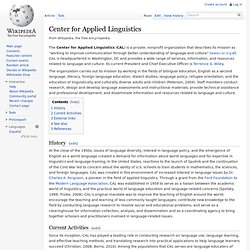
CAL is headquartered in Washington, DC and provides a wide range of services, information, and resources related to language and culture. Its current President and Chief Executive Officer is Terrence G. Center for Applied Linguistics. Moodle. Moodle (acronym for Modular Object-Oriented Dynamic Learning Environment) is a free software e-learning platform, also known as a Learning Management System, or Virtual Learning Environment (VLE).
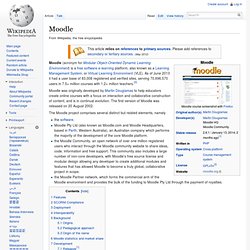
As of June 2013[update] it had a user base of 83,008 registered and verified sites, serving 70,696,570 users in 7.5+ million courses with 1.2+ million teachers.[3] Moodle was originally developed by Martin Dougiamas to help educators create online courses with a focus on interaction and collaborative construction of content, and is in continual evolution. The first version of Moodle was released on 20 August 2002. The Moodle project comprises several distinct but related elements, namely Features[edit] Moodle.org: open-source community-based tools for learning. Language education. Language education is the teaching and learning of a foreign or second language.
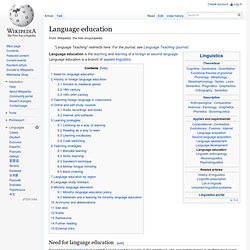
Language education is a branch of applied linguistics. Need for language education[edit] Increasing globalization has created a large need for people in the workforce who can communicate in multiple languages. The uses of common languages are in areas such as trade, tourism, international relations, technology, media, and science. Many countries such as Korea (Kim Yeong-seo, 2009), Japan (Kubota, 1998) and China (Kirkpatrick & Zhichang, 2002) frame education policies to teach at least one foreign language at the primary and secondary school levels.
History of foreign language education[edit] Ancient to medieval period[edit] Although the need to learn foreign languages is almost as old as human history itself, the origins of modern language education are in the study and teaching of Latin in the 17th century. In this work, Comenius also outlined his theory of language acquisition. 18th century[edit]